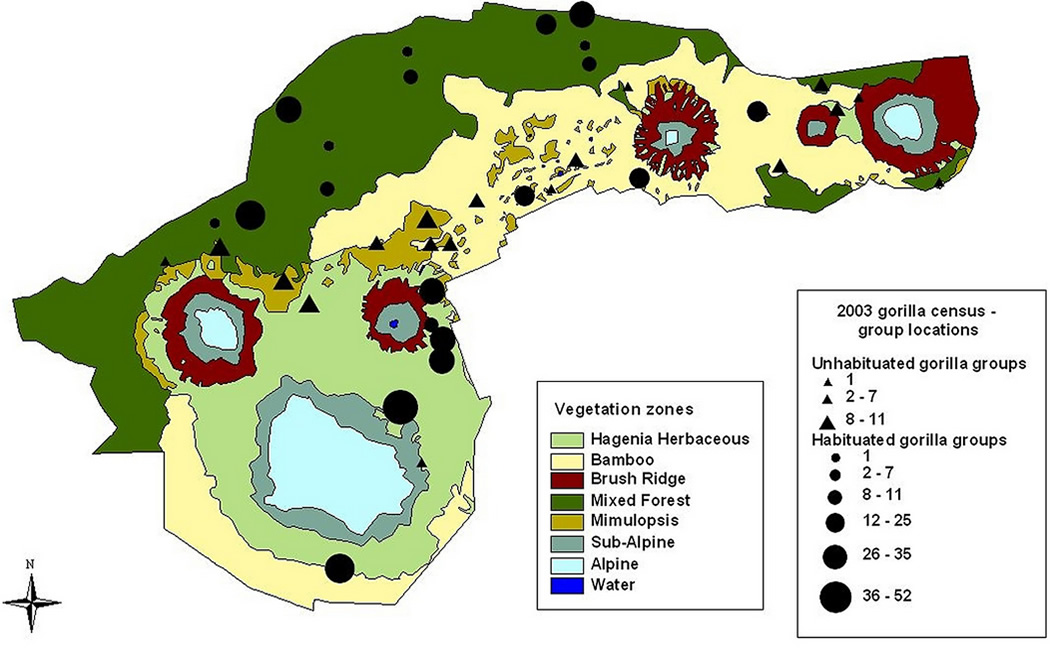Theme: Transboundary Collaboration for effective conservation
1. The Greater Virunga Transboundary Collaboration
The roots of the Greater Virunga Transboundary Collaboration lie in the successful collaboration between park authorities in the key mountain gorilla habitat in the Virungas i.e. Virunga National Park (DRC), Volcanoes National Park Rwanda, Mgahinga Gorilla Park of Uganda.
The trans-boundary collaboration was originally intended to curb poaching and ensure the safety of the mountain gorillas but it later expanded to include the northern part of Virunga in the DRC and other parks in Uganda such as Queen Elizabeth, Rwenzori Mountains and Semuliki National Parks.
With the support of the International Gorilla Conservation Programme and other stakeholders, trust and understanding has been established over several years through the recognition of common purpose and regular communication. Crucially the collaboration has stood firm, despite chronic regional instability and civil war. The recent gorillas census figures show the continued success of the collaboration with the increase in the numbers from 380 to 480 in the Mgahinga, Volcanoes and Virunga National Parks between 2006 and 2010. The census for Bwindi Impenetrable National Park is currently ongoing.
Based on the initial success of the informal collaboration between park staff, the three protected area agencies i.e. the Congolese Institute of Conservation of Nature (ICCN), Rwanda Development Board (RDB) and Uganda Wildlife Authority (UWA), working with various partners within the region, established the Greater Virunga Transboundary Collaboration (GVTC) as a mechanism for strategic, transboundary, collaborative management of the Greater Virunga landscape.
The goal of the GVTC is to improve conservation of wildlife, habitats in the three countries and strengthen the ecological services and thus contribute to improving the socio-economic benefits to the communities.
Through effective transboundary collaboration, the GVTC builds on the successes achieved by local communities in working with the protected areas to enhance their livelihoods into a broader, regional approach that works with all stakeholders in the region.
2. The Regional Transboundary Forum
Today, we are having the first Regional Transboundary Forum, which is one of the six organis of the transboundary collaboration as identified in the draft treaty that set up the collaboration. The other five include:-
- The Summit of Heads of State and Government
- The Council of Ministers
- The Board
- The Executive Secretariat
- The Regional Technical Committees.
The Regional Transboundary Forum, which is held once in two years, is a meeting of a broad spectrum of stakeholders, based on a specific theme agreed upon by members. The event is meant to address the challenges faced in managing the protected areas in our countries and to highlight the importance of transboundary collaboration and stakeholder engagement.
The forum is also meant to update the stakeholders on the status of implementation of the Transboundary Strategic Plan. The stakeholders also use the opportunity to update each other on their various programmes and activities and have an opportunity to exchange ideas related to transboundary collaboration.
The October 11, 2011 regional forum has four specific objectives as listed below:
- Raise awareness amongst the different stakeholders about the importance of transboundary collaboration
- Provide stakeholders with information on the work of the Greater Virunga Transboundary Collaboration.
- Provide opportunity to strengthen partnerships and initiate/develop new ones
- Consolidate current development partner support and identify and develop new support identified and developed.
Sam Mwandha
Executive Secretary
Greater Virunga Transboundary Collaboration
For more information about the Greater Virunga Transboundary Collaboration, please contact The Executive Secretary, Mr. Sam Mwandha on 0776 890 424 and the Communications Officer, Mr. Jean Damascene Hakuzimana on +250 788309578,
Website: www.greatervirunga.org

Leave a Reply